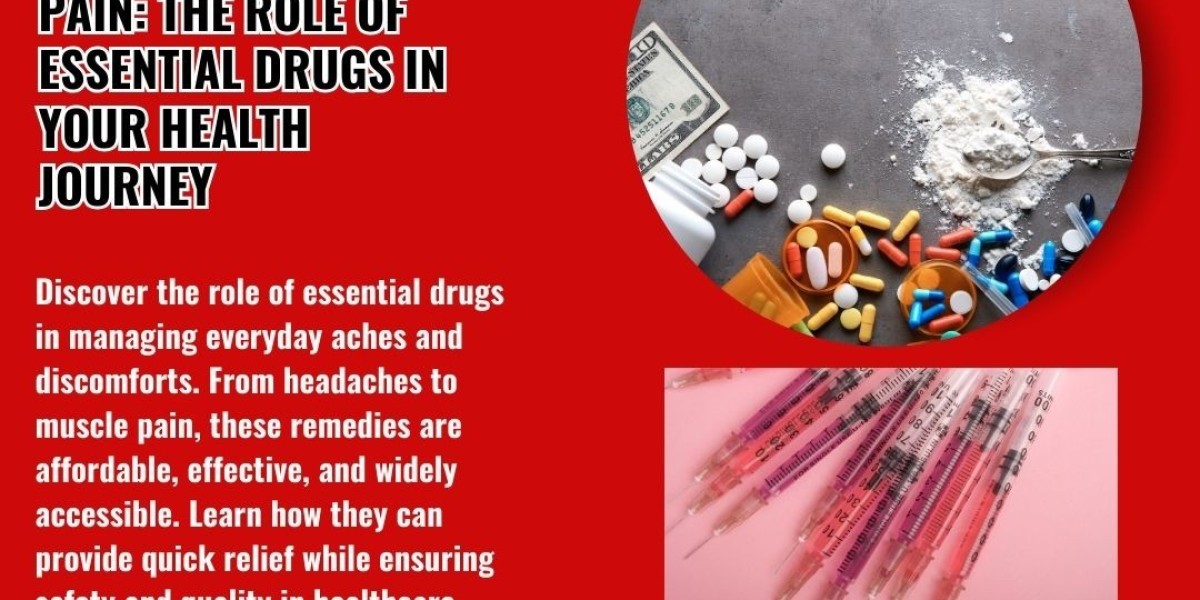Pain is a natural response to injury or illness, and it's something that everyone experiences at some point. From a simple headache to chronic back pain, managing discomfort is a key concern for many people worldwide. Fortunately, essential drugs play a vital role in treating everyday pain, providing relief and helping individuals return to their normal activities. These medications, which are included in the World Health Organization's (WHO) list of essential medicines, are crucial for both immediate and long-term pain management.
Essential drugs are considered necessary for addressing common health issues, including various forms of pain. They are chosen for their effectiveness, safety, and affordability. Pain relief is one of the primary uses of essential drugs, which include both over-the-counter medications and prescription drugs. Understanding how these medications work can help individuals make informed decisions about managing their pain. This article will explore how essential drugs work to treat everyday pain and why CMS ED professionals are essential in managing such treatments.
What Are Essential Drugs?
Essential drugs for pain management include a range of medications designed to alleviate discomfort and restore functionality. These medications are categorized based on their mechanism of action and the severity of the pain they treat. Some of the most common types of essential drugs for everyday pain include:
Nonsteroidal Anti-Inflammatory Drugs (NSAIDs): NSAIDs, such as ibuprofen, aspirin, and naproxen, work by reducing inflammation, which is often the root cause of pain. These drugs inhibit the production of prostaglandins, chemicals in the body that promote inflammation and pain. NSAIDs are commonly used for headaches, arthritis, muscle pain, and menstrual cramps.
Acetaminophen (Paracetamol): This medication is used to treat mild to moderate pain, including headaches, toothaches, and muscle aches. Acetaminophen works by blocking pain signals in the brain and reducing fever. Unlike NSAIDs, acetaminophen does not reduce inflammation but is effective for treating non-inflammatory pain.
Opioids: For severe pain, especially after surgery or injury, opioids such as morphine, oxycodone, and hydrocodone may be prescribed. These drugs work by binding to opioid receptors in the brain and spinal cord, altering the way the body perceives pain. Due to the risk of addiction and other side effects, opioids are typically reserved for short-term use in managing severe pain.
Topical Analgesics: These are creams, gels, or patches applied directly to the skin. They are designed to relieve localized pain, such as that caused by muscle strains, joint pain, or sports injuries. Topical analgesics work by providing cooling or heating effects to the affected area or by delivering pain-relieving substances through the skin.
How Do Essential Drugs Work to Relieve Everyday Pain?
Essential drugs work by targeting different mechanisms in the body to reduce pain and inflammation. The exact mechanism of action depends on the type of drug being used, but generally, these medications work by interfering with the body’s ability to produce or perceive pain signals.
Reducing Inflammation: Many types of pain, such as arthritis or muscle strains, are caused by inflammation. NSAIDs are particularly effective in these cases, as they inhibit enzymes that produce inflammatory chemicals in the body, reducing swelling and easing pain.
Blocking Pain Signals: Acetaminophen and some NSAIDs work by blocking the brain’s pain receptors, preventing the perception of pain. This allows individuals to experience relief from mild to moderate pain without causing the body to lose sensitivity to the pain entirely.
Numbing the Pain Area: Topical analgesics provide localized relief by numbing the affected area or promoting blood circulation. These products are often used for conditions like back pain, joint stiffness, or minor muscle aches.
Altering the Perception of Pain: Opioids work by binding to specific receptors in the brain and spinal cord, reducing the body's response to pain signals. This is why they are used for severe pain, though due to their addictive nature, they are typically prescribed with caution.
Essential drugs can offer effective, targeted pain relief when used appropriately. By choosing the right medication for the type of pain, individuals can manage their discomfort and improve their daily functioning.
Why CMS ED Professionals Are Crucial in Pain Management?
A CMS&ED (Community Medical Services and Essential Drugs) professional is trained to manage essential drugs and provide healthcare services to communities, especially in underserved or rural areas. These professionals are key players in ensuring that individuals receive the appropriate treatment for pain management, as they are responsible for prescribing, dispensing, and educating patients about the safe use of essential drugs.
The CMS&ED program covers a range of important skills and knowledge areas, including:
Pharmacology: Understanding how drugs affect the body and how they interact with other medications is essential in preventing adverse reactions.
Patient Education: CMS&ED professionals educate patients on how to use essential drugs safely, manage side effects, and understand their treatment plan.
Proper Drug Administration: These professionals are trained to administer medications properly, whether orally, topically, or through injection, ensuring patients receive the correct dosage.
By choosing a CMS&ED course, individuals can gain the knowledge and skills needed to manage pain treatment in real-world settings, making them valuable assets to healthcare teams.
The Benefits of CCVTE for Your Career
If you’re interested in pursuing a career in CMS&ED, CCVTE (Central Council for Vocational Training and Skill Education) is an excellent choice. Here’s why:
Comprehensive Curriculum: The CMS&ED course at CCVTE includes both theoretical knowledge and practical training, providing a complete education in the management of essential drugs and pain relief.
Industry Recognition: CCVTE’s certification is recognized by healthcare institutions and employers, which enhances your employability and opens up opportunities in various healthcare settings, such as hospitals, clinics, and community health organizations.
Experienced Faculty: At CCVTE, students learn from experienced professionals who have a wealth of knowledge in both healthcare practices and pharmacology. The instructors provide practical insights and real-world applications of pain management strategies.
Affordable Education: CCVTE ensures that the CMS&ED course is affordable, allowing you to pursue a meaningful career in healthcare without incurring significant student debt.
Job Placement Assistance: CCVTE offers job placement support to its graduates, helping them transition from the classroom to the workforce with ease. Graduates of the CMS&ED program are well-equipped to start their careers in various healthcare roles focused on pain management.
The Value of Skill Development Courses
In today’s healthcare industry, skill development courses are essential for staying competitive and ensuring professional growth. CMS&ED is an ideal field for individuals who want to make a tangible impact in healthcare, especially when it comes to managing pain and administering essential drugs. Skill development courses provide a comprehensive foundation in both the practical and theoretical aspects of healthcare, preparing individuals for various roles.
The benefits of skill development courses include:
Improved Expertise: By completing a skill development course like CMS&ED, you gain specialized knowledge that sets you apart from other candidates in the job market.
Hands-On Training: These courses offer practical experience, allowing students to apply what they’ve learned in real-world settings.
Career Advancement: Skill development courses help professionals climb the career ladder by gaining expertise in specialized areas, such as pharmacology and pain management.
Choosing to invest in skill development courses not only helps you build a strong career but also ensures that you can provide better healthcare services to those who need them most.
Conclusion
Essential drugs are fundamental in managing everyday pain, providing relief from conditions like headaches, arthritis, and muscle aches. From NSAIDs to opioids, these medications help individuals manage both short-term and chronic pain. The role of CMS&ED professionals is crucial in administering these drugs safely, educating patients, and ensuring proper treatment plans.
If you are passionate about healthcare and want to make a difference in pain management, pursuing a CMS&ED course through CCVTE is an excellent choice. CCVTE’s affordable and comprehensive training equips you with the necessary skills to succeed in the healthcare industry. Additionally, skill development courses like CMS&ED provide opportunities for career growth, ensuring that you are always prepared to meet the challenges of the healthcare sector.











